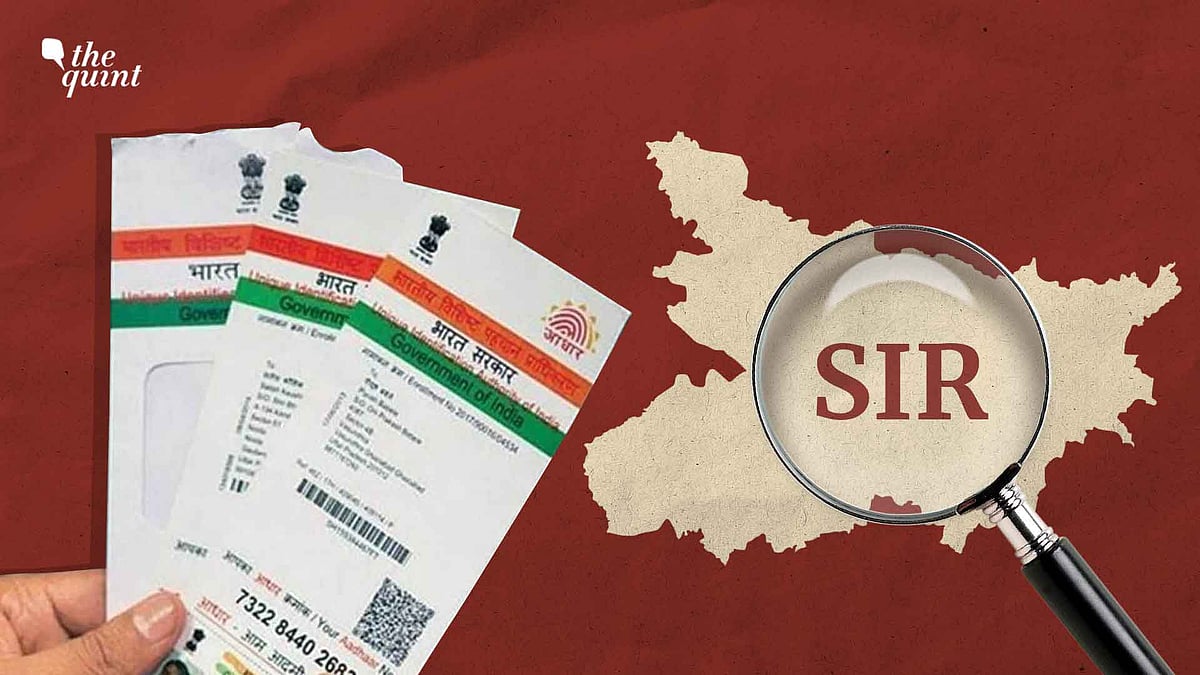
Aadhaar and the Voter List: What the Supreme Court’s Bihar Order Really Means
With 65 lakh names struck off Bihar’s draft rolls, the Supreme Court steps in to set the terms of inclusion.

advertisement
When a voter from Bihar's Sitamarhi district, holding a valid Aadhaar card, approached her booth-level officer in August, she was told it wasn’t an acceptable document.
Days later, her name was missing from the draft voter list.
Her story is among 24 affidavits placed before the Supreme Court by petitioners through senior advocate Kapil Sibal. These showed that citizens across Bihar were being struck off the draft electoral rolls prepared as part of the Special Intensive Revision (SIR) exercise despite possessing Aadhaar cards or voter IDs.
The court observed: "Aadhaar, while nearly universal, is proof of identity, not of citizenship. Nobody wants inclusion of illegal immigrants but genuine citizens should not be turned away merely for lacking a passport, birth certificate or land records."
Why Is This Significant?
On 24 June, the Election Commission of India announced that it would conduct a Special Intensive Revision of voter rolls in Bihar — an exercise that, it claimed, was more than its routine electoral roll cleanups.
The poll body then set out to verify Bihar's nearly 7.3 crore voters to prepare fresh electoral rolls. ECI officials went door-to-door demanding one of 11 specified documents to confirm a person’s identity. These included: birth certificates, passports, educational certificates, permanent residence, forest rights, and caste certificates; the family register prepared by state and local authorities; land or house allotment certificates issued by the government; documents issued to government employees or pensioners; and other documents issued by public authorities before 1967.
The issue, almost immediately, drew sharp political and legal criticism.
The opposition Mahagathbandhan accused the Commission of running "Assam-like NRC" designed to disenfranchise communities that usually vote against the BJP. The BJP, on the other hand, defended the exercise. Union Home Minister Amit Shah told a rally that the opposition was panicking only because “names of infiltrators are being deleted.”
Inside The Courtroom
When the case reached the Supreme Court of India, senior advocate Kapil Sibal, appearing for petitioners, warned that lakhs of genuine voters had been struck off because officials refused to accept Aadhaar.
On the other side, Solicitor General Tushar Mehta, appearing for the Election Commission, argued that Aadhaar, was meant to prove identity, not citizenship. To rely on it alone, he warned, would risk enrolling non-citizens on the rolls.
In subsequent court proceedings, the judges agreed with petitioners on several grounds. "Identity is one thing, citizenship is another," Justice Surya Kant noted. "But if a citizen produces Aadhaar, you cannot throw them out saying this is not acceptable."
Justice Surya Kant reminded the Commission of the Court’s own 2015 judgment on Aadhaar. The Supreme Court had then ruled that no one could be denied a government service for lack of Aadhaar. In 2018, a five-judge bench upheld the Aadhaar programme’s constitutionality, but stressed that it was an identifier, not a citizenship certificate.
Wider Implications
On 1 August, when the ECI published the draft electoral roll for Bihar, they showed 65 lakh names had vanished. After a Supreme Court order, the poll body published the deletions online, booth by booth, marking reasons behind these deletions, like "dead," "duplicate," or "moved."
But the affidavits, submitted in the top court, suggested that voters with Aadhaar or even existing voter ID cards were dropped without explanation.
By insisting Aadhaar be accepted, the Supreme Court has ensured that now, if a voter shows up with Aadhaar, their identity must be recognised unless officials have concrete reasons to doubt their citizenship, setting a precedent for inclusion as against exclusion as was argued by the critics of SIR in the beginning.
Further, the implications extend well beyond Bihar. The Election Commission has already signalled similar revisions across other states before 2026. After this ruling, excluding Aadhaar elsewhere would be legally untenable.
On 8 September, when the court finally asked the poll body to accept Aadhaar for the purposes of SIR, it ensured that the fundamental right to vote is not taken away merely because of bureaucratic suspicion.
At the same time, it also ensured that the woman in Sitamarhi, who was among the many turned away by BLOs because they only possess Aadhaar as proof of identity, can now go back and register her name on the electoral roll.
- Access to all paywalled content on site
- Ad-free experience across The Quint
- Early previews of our Special Projects
Published: undefined